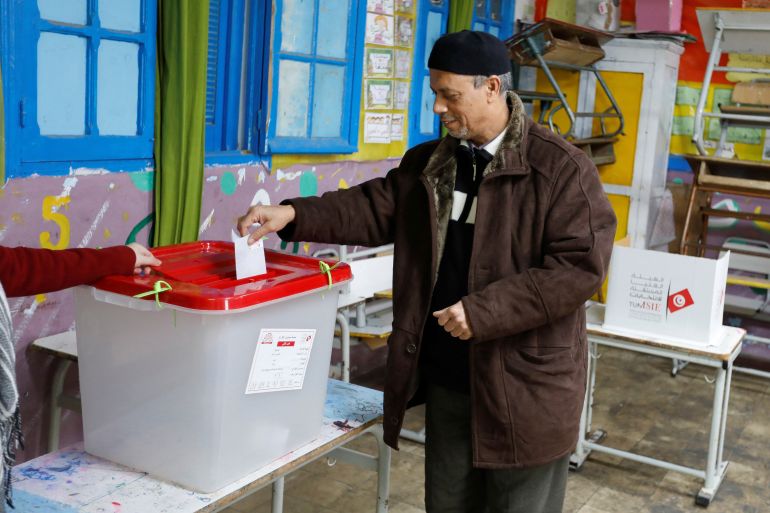Low turnout expected as Tunisia holds parliamentary elections
In Sunday’s second round, voters are choosing among 262 candidates seeking to fill the 131 remaining seats.

Tunisia is going to the polls in the second round of parliamentary elections amid political and economic woes in the North African country.
Polls opened at 8am (07:00 GMT) on Sunday and voters are choosing among 262 candidates seeking to fill the 131 remaining seats.
Keep reading
list of 3 itemsAnti-gov’t protests in Tunisia on revolution anniversary
Tunisia increasingly isolated under Saied as US loses interest
In the seven constituencies with no candidate, special elections will be held later to fill the seats, likely in March.
President Kais Saied sacked the government in July 2021 and froze parliament before dissolving it and changing the constitution – abolishing the hybrid parliamentary system that had been in place since 2014.
Since Saied was elected president in 2019 with 72 percent of the vote, his support among Tunisians has dulled.
The first round of voting in December saw just 11.2 percent of registered voters take part and 23 candidates secured seats outright, 10 of them because they ran unopposed and 13 because they won more than 50 percent of the vote, according to election officials.
Sunday’s second round is seen as the final pillar of Saied’s transformation of politics in the birthplace of the Arab Spring. The new legislature, however, will have almost no power to hold the president to account.

‘Little legitimacy’
“I don’t plan to vote,” said Ridha, a carpenter in the capital Tunis who declined to provide his surname, according to AFP news agency. “I can’t trust anyone any more.”
Analysts predict another low turnout among Tunisia’s 7.8 million eligible voters as major parties, including Saied’s arch-rivals Ennahdha, hold a boycott.
Some Ennahdha officials have been jailed, and the party is refusing to take part in the parliamentary elections and has held repeated protests.
Youssef Cherif, director of Columbia Global Centers in Tunis, told AFP “this parliament will have very little legitimacy, and the president, who is all-powerful thanks to the 2022 constitution, will be able to control it as he sees fit”.
Tunisians have a “lack of interest” in politics, Cherif added.
‘Dramatic’ situation
With inflation at more than 10 percent and repeated shortages of basic goods from milk to cooking oil, Tunisia’s 12 million people have been focused on more immediate issues.
Global ratings agency Moody’s on Saturday downgraded Tunisia’s credit rating to Caa2, citing “the absence of comprehensive financing to date to meet the government’s large funding needs”.
According to the latest figures from the National Institute of Statistics, unemployment has reached more than 18 percent and exceeds 25 percent in the poor regions of the interior of the country, while the inflation rate is 10.1 percent.
For several years, Tunisia has suffered from record budget deficits that affect its ability to pay suppliers of medicines, food and fuel, causing shortages of milk, sugar, vegetable oil and other staples.
More than 32,000 Tunisians are estimated to have emigrated irregularly over the past year, amid sluggish growth and rising poverty and unemployment.
The election takes place in the shadow of Tunisia’s drawn-out negotiations with the International Monetary Fund for a bailout worth nearly $2bn.